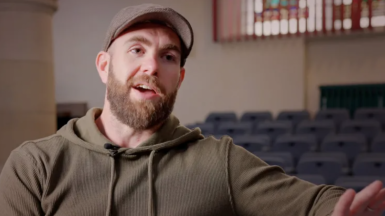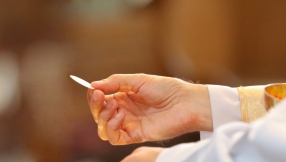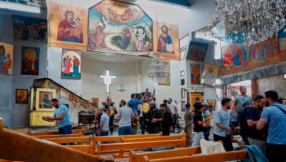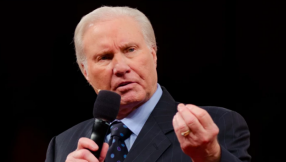
Steve Osmond, a zoologist and scientist, has just moved with his family from South Africa to Scotland to take up a new role at the Solas Centre for Public Christianity as an apologist and evangelist.
Solas' assistant director Gavin Matthews has called Osmond an answer to prayer in a time of spiritual need for Scotland.
"For many years Scotland was noted for sending missionaries to Africa," he recently remarked. "It's rather pleasing that in our time of spiritual need, Africa is now sending them to us. Jesus said, 'The harvest is plentiful, but the labourers are few; therefore pray earnestly to the Lord of the harvest to send out labourers into his harvest.' At Solas we have been praying for a long time for an additional evangelist-apologist and so we gratefully welcome Steve as an answer to our prayers."
As he embarks on this new chapter, Christian Today speaks to Steve about the spiritual climate in South Africa and Scotland, and his desire to see Christians grow in confidence to share the Gospel.
CT: You've just moved from South Africa to Scotland to take up your new role at Solas. Although it's still early days, has anything struck you about the spiritual state of the country and the Church?
Steve: Just from walking around, I've noticed a lot of old church buildings that have been converted into clubs, pubs and other spaces. That speaks volumes about the decline of Christianity here. From some of our own conversations with people, there seems to be a bit of apathy. This may be down to some antagonism towards the faith but I think there are also just a lot of distractions at the moment with all the things going on in life. And on top of that, there's also a lot of loneliness and depression at the moment. These give some indication of the spiritual state of things.
CT: How does this compare with South Africa?
Steve: I think the speed and extent to which things have changed here does seem to be a little more intense, but South Africa is a very interesting place because it's extremely multicultural and so there are other issues that Christians have to speak into, like ancestor worship, which I don't see here.
In terms of the big liberal trends from the likes of the US and the UK, there used to be about a 10-year lag before they caught on in South Africa. Now, because of social media, the speed at which ideas move across the pond is much quicker. We have some pockets of extreme liberalism and atheism, especially in university. Smaller groups pick these ideas up and then it grows from there.
CT: How are you looking to bring your experience as an apologist and evangelist in the South African context into your new role in Scotland?
Steve: I think that's something I will be learning as I go but my degrees are in science and theology, and my evangelistic background is in university settings where I've been involved in helping people to see that faith and science are compatible. The work I've done in that area translates really well to the Scottish context.
In the West, there's a very entrenched attitude in universities that science is all about facts and what's real, whereas faith somehow isn't, and therefore you can only believe in science or faith, but not the two together. Or that because of advancements in science and technology, belief in God is just something our grandfathers and great-grandfathers did, and isn't needed anymore. That attitude does seem to be a bit stronger here than in South Africa.
CT: In your experience, are young people open to the Gospel? Are they searching?
Steve: There is definitely an openness. Students are asking questions, they're searching for their identity and trying to figure out what they believe and what they feel strongly about. From what I've seen in the last few years, the militant atheism of about 10 years ago has waned a little bit and people seem to be a bit more open.
People are searching for meaning and purpose and they want to find something that actually works. Once you show the inconsistencies of atheism in terms of those deep human longings, people are very eager to hear what Christianity has to offer and there's a real openness to finding out how faith in Jesus works in terms of the existential experience of day to day life and how it answers the big questions of life, where atheism has failed again and again. Students are actually very open.
CT: What excites you about your new role at Solas?
Steve: The things that excite me are also the things that fill me with a bit of trepidation! Even though I'm involved in university missions, I wouldn't call myself a natural evangelist. For years growing up in the church, I would look at missionaries and the guys going out to do university missions and think to myself that there was no way I could ever go out and do that! I suppose the Lord had other plans and I felt that call on my life, but the trepidation has remained alongside the excitement of going out into universities and sharing the Gospel.
With Solas I'll be doing a lot of university missions and teaming up with Christian Unions and other fellowships. The other aspect of my work will be training Christians to not be afraid of the idea of evangelism. Because I was in that place and very much consider myself not to be the natural evangelist, I just want to see more people find the joy of being able to step into a conversation, be able to answer questions, and see people open up to the possibility that God exists and the Bible has something to say to their circumstances. I don't think there's anything greater than seeing that happen in front of you while you're chatting to someone.
CT: Do you have any tips for someone who may be lacking the confidence to share their faith?
Steve: For the person who thinks 'I'm not equipped', 'I'm terrified', the first thing to understand is that this is what God has asked us to do - think of passages in the Bible like 1 Peter 3:15 or Matthew 28:18-20 and the Great Commission. God will give us what we need and His peace when we rely on Him as we do these things. Our confidence is in knowing that this is the work God is doing. It's not on us to convert people - that's what God does. Our job is to point people to Him.
The second thing is to simply share the truth about what God has done in your life. Just openly and boldly tell someone about Him and then take the conversation from there, one step at a time. Finally, they can pick up an apologetics book or go to the Solas website and watch some of our Short Answer videos which offer straightforward answers to some common questions about the Christian faith.
Speaking from my own experience as someone who didn't feel like a natural evangelist, it was as I learned apologetics and good answers to these questions that my confidence grew. There are actually really good answers to the questions that people have. That was the thing that used to terrify me - that I wouldn't know the answer to a question - but the more I chatted to people, the more I naturally grew in confidence. And if I didn't have the answer, I would just say: hey, I don't know, but let's find out together.
What can Christians pray for as you take up your new role?
Steve: Firstly, wisdom for us as a family as we try to settle in and get connected to a good community that can support us as we find our feet, and secondly, wisdom for my work with Solas and that the Lord would bring great opportunities to speak into places where we maybe haven't had inroads yet, wherever that might be and whatever the need might be. It's my prayer that God would open doors so that we can go and do the work that He has called us to do there.













